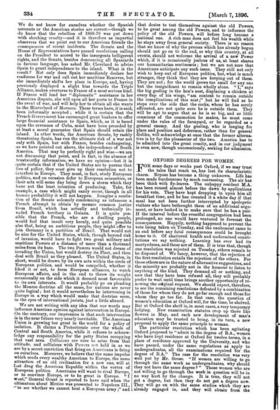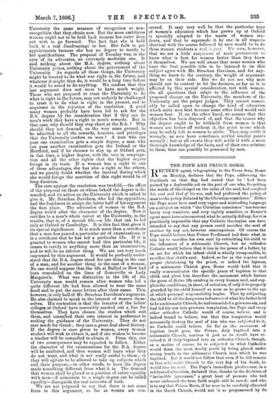OXFORD DEGREES FOR WOMEN.
FOR some days or weeks past Oxford, if we may trust the tales that reach us, has lost its characteristic charm. Repose has become a thing unknown. Life has been made burdensome by much canvassing. The air has been thick with fly-leaves. The unhappy resident M.A. has been roused almost before the dawn by applications for his vote. They have kept dropping in upon him all breakfast time, and he has counted it a white day if that meal has not been further interrupted by apologetic visitors who have bethought them of an additional argu- ment, or have looked in to make sure that he has a pair. If the interval before the eventful congregation had been prolonged, no one would have ventured to forecast the consequences. Happily, nothing happened to prevent the vote being taken on Tuesday, and the excitement came to an end before any fatal consequences could be brought home to it. Of shattered health and undermined consti- tutions we say nothing. Learning has ever had its martyrdoms, and these are of them. It is true that, though one resolution was rejected on Tuesday, others remain to be disposed of. We fancy, however, that the rejection of the first.resolution entails the rejection of the others. For these others are in the nature of alternative suggestions, and the minority are probably not in the humour to listen to anything of the kind. They demand all or nothing, and now that they have been refused all, they will probably prefer to wait until time brings another opportunity of re- newing the miginal request. We should expect, therefore, to see the remaining resolutions defeated by a combination of those for whom they do not go far enough and those for whom they go too far. In that case, the question of women's education at Oxford will, for the time, be shelved. But at Oxford the shelf is, in most cases, a very temporary lodging. New examination statutes crop up there like flowers in May, and each new development of man's education may be trusted to bring, in its turn, a new proposal to apply the same principle to woman.
The particular resolution which has been agitating Oxford proposed to "admit to the degree of B.A., women who have kept residence at Oxford for twelve terms, in a place of residence approved by the University, and who have passed, under the same regulations as apply to undergraduates, all the examinations required for the degree of B.A." The case for the resolution was very well put by Mr. Grose. "If women are willing to go through the same work as undergraduates, why should they not have the same degree ? " Those women who are not willing to go through the work in question will be in no way hurt by the change. It is true, they will not get a degree, but then they do not get a degree now. They will go on with the same studies which they are already engaged in, and they will obtain from the University the same measure of recognition or non- recognition that they obtain now. But the more ambitions woman ought not to be held back because her sister does not wish to go forward. The fact that she is held back is a real disadvantage to her. She fails to get appointments because she has no degree to testify to her qualifications. The proposal of Tuesday was, in the eyes of its advocates' an extremely moderate one. It said nothing about the M.A. degree, nothing about University prizes, nothing about the government of the University. As regards all these things, the University might be trusted to do what was right in the future, and whatever it might then do, it would be a long time before it would be asked to do anything. We confess that this last argument does not seem to have much weight. Those who are prepared to trust the University to do what is right in the future, may not unfairly be challenged to trust it to do what is right in the present, and to acquiesce in the rejection of the resolution. A good many women probably have been led to ask for the RA. degree by the consideration that if they can do men's work they have a right to men's rewards. But in that case, why should they stop short at the B.A.? Why should they not demand, on the very same ground, to be admitted to all the rewards, honours, and privileges that the University confers on men ? A man who can pass one examination gets a simple degree, a man who can pass another examination gets the Ireland or the Hertford, and if he chooses to stay up at Oxford gets, in due time a higher degree, with the vote in congrega- tion and an the other rights that the higher degree brings in its train. If a woman has a right to one of these advantages, she has also a right to the others, and we greatly doubt whether the interval during which she would forego the assertion of this right would be of long duration. The case against the resolution was twofold,—the effect of the proposal on those on whose behalf the degree is de- manded, and its action on the University which is asked to give it. Mr. Strachan Davidson, who led the opposition, had the frankness to assign the latter half of his argument the first place. The admission of women to the B.A. degree would alter the character of the degree. Now it certifies to a man's whole career at the University, to the results, that is, of a special life,—a life that can be led only at Oxford or Cambridge. It is this fact that gives it its special significance. It is much more than a certificate that a man has passed a particular set of examinations, it is a certificate that he has led a particular life. If it is granted to women who cannot lead this particular life, it ceases to certify to anything more than an examination, and so will be an inferior thing. We are not very much impressed by this argument. It would be perfectly under- stood that the B.A. degree stood for one thing in the case of a man, and for another thing in the case of a woman. No one would suppose that the life at BaIliol or New had been remodelled on the lines of Somerville or Lady Margaret's. What was distinctive in the life of the University man would remain after women who led a quite different life had been allowed to wear the same hood and to put the same letters after their name. This, however, is only half of Mr. Strachan Davidson's argument. He also claimed to speak in the interest of women them- selves. His contention is that the inmates of the ladies' colleges at Oxford have insensibly marked out a line for themselves. They have chosen the studies which suit them, and consulted their own interest in preference to seeking the guidance of the University. They do not care much for Greek ; they care a great deal about history. If the degree is once given to women, every woman student will wish to obtain it, and if she wishes to become a teacher will be compelled to obtain it. From this, one of two consequences may be expected to follow. Either the character of the examinations for the B.A. degree will be unaltered, and then women will learn what they do not want, and what is not really useful to them ; or they will agitate to be allowed to take up subjects which suit their purpose,—in other words, to have the degree made something different from what it is. The demand that women shall be placed in a position of entire equality with men—if admission to a single degree can be called equality—disregards the real interests of both.
We are not prepared to say that there is not some force in this argument, so far as women are con- cerned. It may very well be that the particular type of women's education which has grown up at Oxford is specially adapted to the wants of women stu- dents, and that to supersede it by one in all respects identical with the course followed by men would be to do these women students a real ii.jury. We own, however, that we are a little suspicious of male pretensions to know what is best for women better than they know it themselves. We are well aware that some women who have the best possible title to be listened to on this subject agree with Mr. Strachan Davidson, and for any- thing we know to the contrary, the weight of argument may be on their side. But we do not see why men should not be content to let the decision, so far as it is affected by this special consideration, rest with women.. On all questions that relate to the influence of the proposed change on the University, the members of the University are the proper judges. They cannot reason- ably be called upon to change the kind of education which suits men best because some other kind would suit women best. If, on the other hand, we assume that this objection has been disposed of, and that the reason why the degree ought to be withheld from women is that women are better off without it, the point is one which may be safely left to women to settle. They may settle it wrongly, as men have sometimes settled similar points wrongly ; but at all events they will settle it with a more thorough knowledge of the facts, and of their own relation to them, than can possibly he possessed by men.







































 Previous page
Previous page